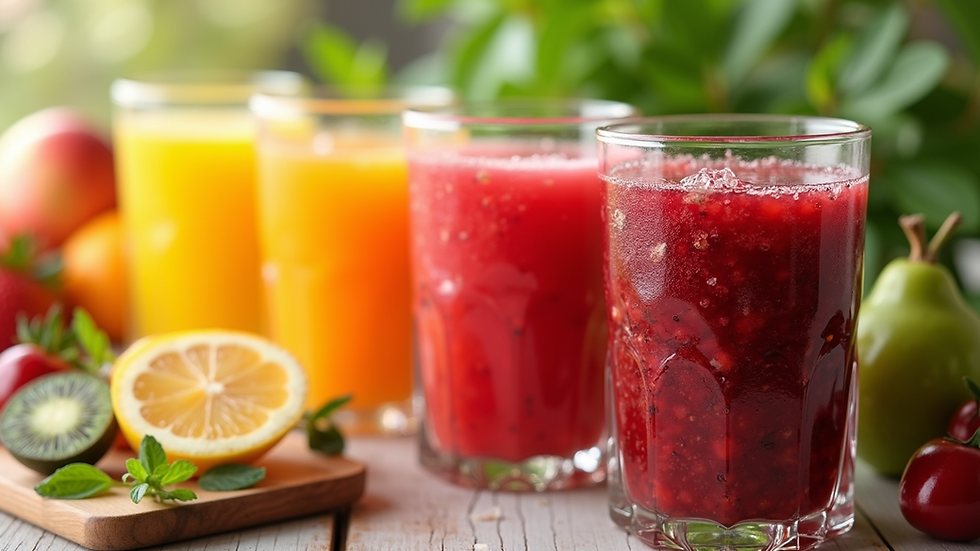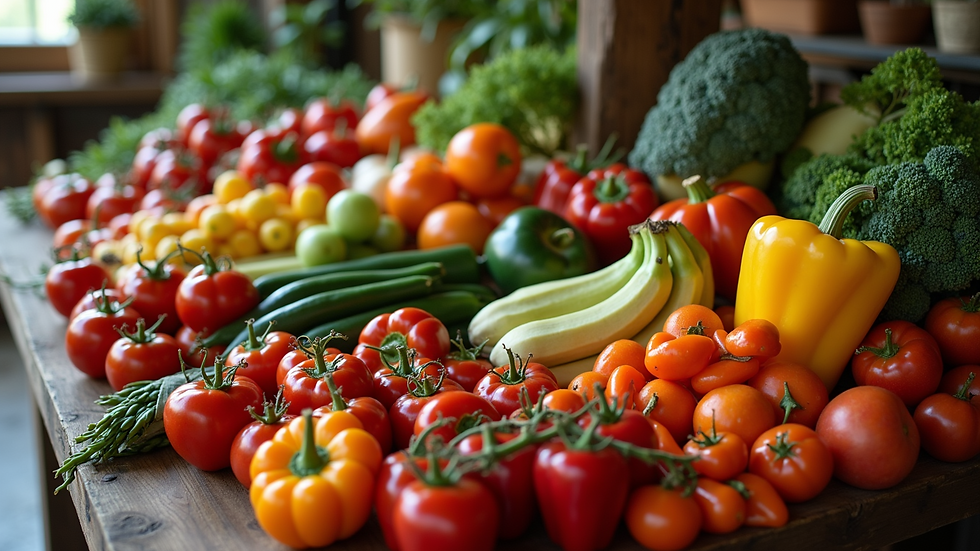Water Fast vs Juice Fast: Weighing the Pros and Cons
- emmelie forsyth
- May 19, 2025
- 4 min read
Fasting has become a popular choice for many looking to detoxify, lose weight, and improve overall health. Two well-known forms of fasting are water fasting and juice fasting. With distinct followers and benefits, understanding the differences is essential. In this article, we'll break down the pros and cons of each method, helping you choose the best one for your health goals.
What Is Water Fasting?
Water fasting is the practice of consuming only water while avoiding all solid food and calorie-containing drinks for a set period. This fasting can range from 24 hours to several days. Advocates often emphasize its benefits for cleansing the body and improving metabolic function.
Pros of Water Fasting
Simple and Easy to Follow: Water fasting is straightforward. Without the need to prepare meals or drinks, it simplifies your day-to-day decisions around food, making it easier mentally for some people.
Promotes Autophagy: This fasting approach may stimulate autophagy, a natural process that helps cells remove damaged components and regenerate new, healthy cells. A study found that fasting could increase autophagy activity in certain cells up to 50% after just 24 hours without food.
Weight Loss: Water fasting can lead to significant weight loss, especially in the initial stages. For example, individuals may lose 2 to 5 pounds within the first couple of days, primarily due to water weight. Following that, the body starts burning fat reserves.
May Lower Blood Sugar: Research indicates that water fasting can enhance insulin sensitivity and lower blood sugar levels. One study showed that participants who fasted for 16 hours had a decrease in blood sugar levels by approximately 10% after just a few days of fasting.
Cons of Water Fasting
Nutrient Deficiency: Prolonged periods of fasting can result in a lack of essential nutrients. For instance, prolonged water fasting beyond a few days may lead to deficiencies in vitamins such as B12, which can adversely affect energy levels and overall health.
Hunger and Cravings: Many find it hard to deal with intense hunger and cravings that arise after just a day without food. Research shows that after 24 hours of fasting, around 70% of participants reported cravings.
Potential Risks: Water fasting is not suitable for everyone. It can be risky for individuals with existing health problems like diabetes, as it can lead to dangerous drops in blood sugar levels.
Fatigue and Dizziness: Common side effects include fatigue, dizziness, and irritability, particularly during extended fasts. Approximately 30% of those who begin a water fast for several days report these symptoms affecting their daily activities.
What Is Juice Fasting?
Juice fasting involves consuming only fresh fruit and vegetable juices while steering clear of solid foods. This method aims to provide essential nutrients while promoting detoxification. Juice fasts can vary in duration and often include a wide range of fruits and vegetables for both flavor and health benefits.
Pros of Juice Fasting
Provides Nutrients: Juice fasting can offer vital vitamins and minerals, making it a more balanced option than water fasting. A typical juice can contain 50-100% of your daily vitamin C needs per serving, depending on the ingredients.
Easier to Sustain: Many find juice fasting easier because it allows for more variety and taste. A study found that 68% of participants preferred juice fasting over water fasting for this reason.
Supports Hydration: Juices provide hydration and nutrients, aiding in digestion and promoting overall wellness. Drinking juices can significantly contribute to your daily fluid intake, with many juices consisting of over 90% water.
Gentler Detox: Juice fasting is often considered a milder detox method. It facilitates the elimination of toxins without overwhelming feelings of hunger that can occur with water fasting.
Cons of Juice Fasting
Higher Caloric Intake: It's easy to unintentionally consume more calories through juices than planned. For example, a single store-bought juice can contain anywhere from 150 to 250 calories, which can hinder weight loss efforts.
Blood Sugar Spikes: Juice fasting may cause blood sugar levels to rise, particularly when juices are heavy in natural sugars from fruits. People with diabetes need to be cautious, as high-fructose juices can elevate blood sugar levels by up to 50% in some cases.
Lack of Fiber: While juices deliver nutrients, they lack the fiber necessary for optimal gut health. Fiber is crucial for regulating digestion and can help you feel full longer, which is absent in pure juices.
Short-Term Results: Many people experience temporary weight loss during a juice fast, but this can quickly reverse if unhealthy eating habits resume. Studies show that individuals may regain up to 80% of lost weight within a month of returning to regular eating patterns.
Choosing the Right Fast for You
Deciding between water fasting and juice fasting requires careful consideration of your health goals, lifestyle, and any underlying health issues. Here are some important factors to think about:
Health Status: If you have conditions like diabetes or are pregnant, seek advice from a healthcare provider before trying either fasting method.
Weight Loss Goals: Both methods can result in short-term weight loss. However, for lasting results, continuous healthy eating practices should be maintained after the fast.
Duration: Assess how long you intend to fast. Short water fasts may work well for some, while juice fasting could be preferable for those concerned about nutrient intake.
Hunger Management: If you are sensitive to hunger, consider juice fasting. The variety of flavors can help satisfy cravings more effectively than water alone.

Making the Right Choice
Water fasting and juice fasting each have their unique sets of benefits and challenges, appealing to different individuals based on goals and preferences. By understanding these factors, you can make a more informed decision.
If your focus is on weight loss, detoxification, or overall health, listen to your body and consult a professional if needed. Both methods can yield valuable results, but it's important to choose the one that aligns with your personal health goals and lifestyle.
Explore both water and juice fasting to discover which is best for you, ensuring that your path to wellness is both effective and enjoyable.



Comments